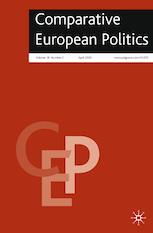Artykuł dr. Adama Kirpszy w czasopiśmie z impact factor'em ("Comparative European Politics")

Z radością informujemy, że w czasopiśmie "Comparative European Politics" (CEP) ukazał się artykuł członka zespołu JMC EUCRIS, dr. Adama Kirpszy, pt. Better together? Explaining Poland’s and Germany’s bargaining success in EU lawmaking. Artykuł dowodzi przy użyciu modelowania statystycznego, że Polska i Niemcy są skazani na siebie, tj. muszą ze sobą współpracować, jeśli chcą wygrywać w UE. Spośród wszystkich największych państw członkowskich tylko koalicja polsko-niemiecka istotnie zwiększa sukces Polski i Niemiec w procesie legislacyjnym UE, przy kontrolowaniu innych zmiennych negocjacyjnych.
"Comparative European Politics" jest jednym z najważniejszych czasopism poświęconych funkcjonowaniu Unii Europejskiej, indeksowanym w bazach SCOPUS i Web of Science oraz posiadającym Impact Factor (IF) wynoszący 1.202 (dla 2018 r.). "CEP" znajduje się w pierwszym kwartylu (Q1) rankingu czasopism w obszarze nauk o polityce (kwartyl ten obejmuje 25% najlepszych czasopism o najwyższym IF).
Zachęcamy do przeczytania!
Abstract:
The article seeks to explain the bargaining success of Poland and Germany in EU lawmaking. Specifically, it explores how the similarity of Poland’s and Germany’s preferences affects their bargaining success and whether it is more beneficial than their proximity to other member states holding the highest voting power. The analysis conducted on the DEUII dataset leads to three conclusions. First, there is a strong discrepancy between Poland’s and Germany’s preferences. Second, despite having divergent preferences, both Poland and Germany are more successful when they approximate or hold similar positions on EU legislation. Importantly, this relationship is robust to the extremity of their preferences, the status quo position, their closeness to the Parliament and Commission, the proposal’s multidimensionality, procedure or policy area. Third, bringing preferences closer provides both Poland and Germany with higher success than moving their policy positions towards other pivotal member states, namely France, the UK (except for Poland), Italy and Spain. Overall, the paper demonstrates that mutual cooperation (i.e. the approximation or exchange of preferences) is extremely profitable for Poland and Germany as their success is strongly dependent on the level of similarity of their preferences, irrespective of other negotiating conditions and relations with pivotal actors



